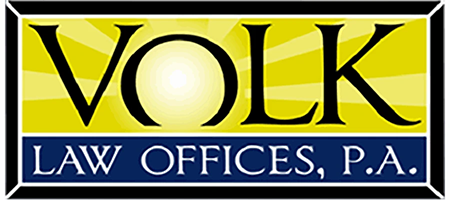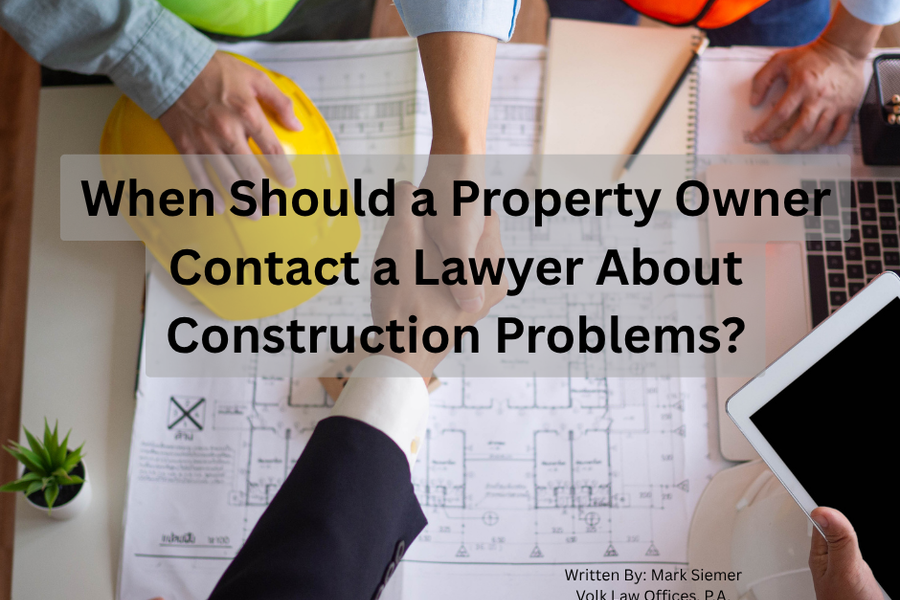When Should I Contact a Lawyer About Construction Problems?
Posted: August 11th, 2025
Written By: Mark Siemer
The best time for a property owner to contact a lawyer about a construction problem is before the property owner and the contractor sign a contract. Sometimes attorneys are your advocate and sometimes they are your advisor and if you contact an attorney to advise you on the contract you are considering signing, they can help you understand the risks you bear and the gambles you are taking. The next best times are when communications on the project start to break down, when the contractor is demanding extra payment or when the property owner is considering refusing to pay.
Waiting to talk to an attorney when there is a problem on your construction project usually means letting the pressure build.
1. During Contract Negotiation
A construction contract defines the scope of work and allocates risk. If a property owner agrees to the contractor’s standard contract, the allocation of risk is going to be very lopsided and can seriously diminish the property owner’s ability to protect themselves in the future. Conferring with an attorney at this stage can enable a property owner to better understand the risks they are taking if they agree and can help them clarify any ambiguity that might exist. Lots of property owners think they can rely on the “industry standard.” But the “industry standard” was made by the industry, for the industry. Ambiguity in the standard can allow the contractor to save costs in places where the property owner does not want them to. And worse, it can create ambiguity that drive up attorney’s fees in the future.
2. When There Is a Breakdown in Communications
Whether the project is a simple one-day remodel or improvement of a property or a two-year new build, the property owner and the contractor need to be on the same page about a lot of details. That means communication.
Having an attorney appear at this stage in the process can often cut off communications by forcing the parties into an openly adverse position. I.E. if you get an attorney, they will get an attorney. But consulting with an attorney when communication slows to a snail’s pace can be vital to make sure you are preserving evidence, phrasing demands properly and checking all the boxes you need to check to terminate for cause in the future.
3. When the Contractor Demands Additional Payment
Change orders and demand for extra payment are common. Sometimes they are justified and sometimes they are not. Whether a property owner is requesting the change order or the contractor is demanding one, it is important to consult an attorney. If the contract contains a provision regarding change orders, it is important to follow the provision and to observe its requirements. Otherwise, the property owner is setting themselves up to be the victim or a waiver defense. Also, if a property owner starts deviating from the contract the property owner is creating the possibility that they refuse to pay because they mistakenly believe that the contractor breached first. Before agreeing too or refusing to agree to a change order or a demand for additional payment, it is important to know your rights under the contract.
4. If You’re Considering Withholding Payment
Property owners only have a few ways to try to control a contractor once the contract is signed. One way to control the contractor is by paying them or refusing to pay them. Refusing to pay them, even when justified, could be a huge strategic mistake because of outside factors. For example, proving that a contractor performed work so poorly you are excused from performing your obligations under the contract is complicated and multifaceted. But for the contractor, proving that you didn’t pay them is simple and easy. It might be even worse if you threaten not to pay and the contractor stops working. Now, the property owner has a half-finished project that they have to live with and figure out how to deal with. That might be inconvenient, or it might hold up the whole project and cut off funds from the bank. Sometimes it is better to get a poor job to the finish line and fight about the issues after completion than stopping the job halfway through.
If a project has gotten so bad that the property owner is considering refusing to pay the contractor, speaking to an attorney is vital. Failing to pay the contractor is a sure-fire way to set yourself up for litigation. Sometimes that is the right decision and sometimes it is not. Talking to a seasoned construction lawyer before you choose to withhold payment is essential to protect yourself.
Best Practices
- Create a detailed scope of work. Stating what is NOT included can be as important as stating what is included.
- Document everything. An attorney can help you clarify your written communications to create a clear history of complying with the contract.
- Advisor and advocate. Consulting with an attorney to serve as your advisor before there is a problem is usually cheaper than retaining an attorney to act as your advocate after there is a problem.
- Notice and procedure. If the project devolves into a lawsuit, a core question will be who materially breached the contract first. Failure to put a contractor on notice of a default pursuant to the terms of the contract can be fatal to a property owner’s case or worse, it can make the property owner the first party to materially breach the contract, even if the contractor has walked off the job.
Construction law is complex, and the risks of proceeding without legal advice can be severe. If you encounter any of the above four scenarios, consulting a qualified construction lawyer is strongly recommended to protect your investment and avoid costly mistakes.
Need assistance with arbitration clauses? Call Volk Law Offices and ask for Mark Siemer at 321-726-8338.
The matters discussed here are general in nature and are not to be relied upon as legal advice. Every specific legal matter requires specific legal attention.
The law is constantly changing and matters discussed today may not be the same tomorrow. Legal matters are also subject to different interpretations by attorneys, judges, jurors and scholars. No attorney-client relationship is intended or created as a result of matters discussed here. You should consult counsel of your choice if you have any dealings in these areas of the law. Volk Law Offices, P.A. and its attorneys make no representations or warranties with respect to the accuracy or completeness of the matters addressed.

